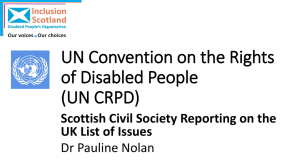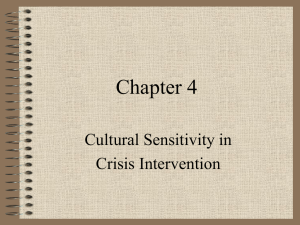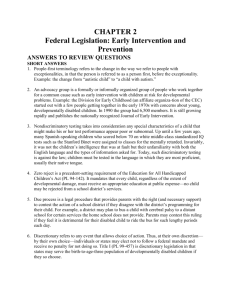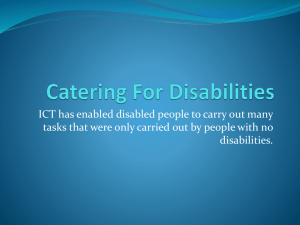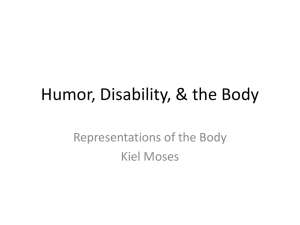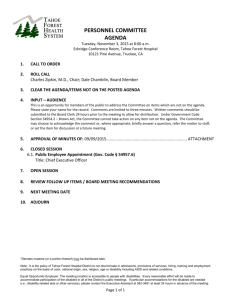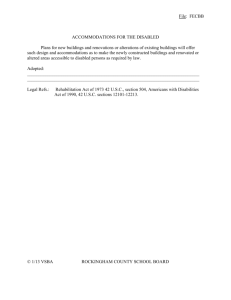Equal opportunities committee-written evidence on budget Oct 2013
advertisement
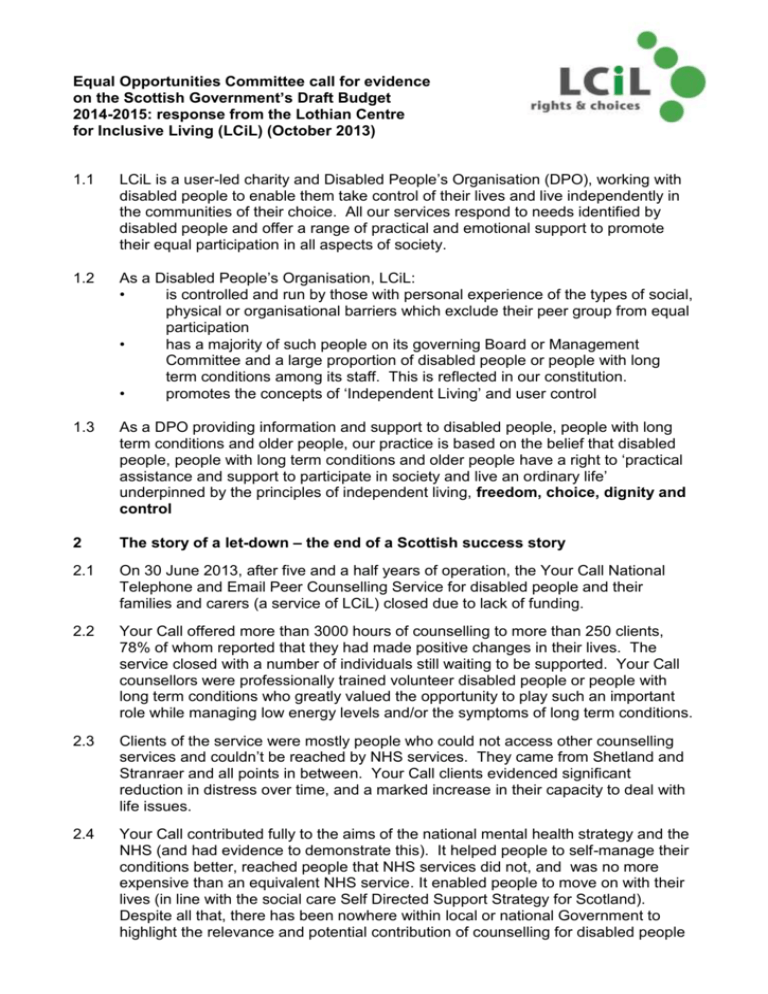
1 Equal Opportunities Committee call for evidence on the Scottish Government’s Draft Budget 2014-2015: response from the Lothian Centre for Inclusive Living (LCiL) (October 2013) 1.1 LCiL is a user-led charity and Disabled People’s Organisation (DPO), working with disabled people to enable them take control of their lives and live independently in the communities of their choice. All our services respond to needs identified by disabled people and offer a range of practical and emotional support to promote their equal participation in all aspects of society. 1.2 As a Disabled People’s Organisation, LCiL: • is controlled and run by those with personal experience of the types of social, physical or organisational barriers which exclude their peer group from equal participation • has a majority of such people on its governing Board or Management Committee and a large proportion of disabled people or people with long term conditions among its staff. This is reflected in our constitution. • promotes the concepts of ‘Independent Living’ and user control 1.3 As a DPO providing information and support to disabled people, people with long term conditions and older people, our practice is based on the belief that disabled people, people with long term conditions and older people have a right to ‘practical assistance and support to participate in society and live an ordinary life’ underpinned by the principles of independent living, freedom, choice, dignity and control 2 The story of a let-down – the end of a Scottish success story 2.1 On 30 June 2013, after five and a half years of operation, the Your Call National Telephone and Email Peer Counselling Service for disabled people and their families and carers (a service of LCiL) closed due to lack of funding. 2.2 Your Call offered more than 3000 hours of counselling to more than 250 clients, 78% of whom reported that they had made positive changes in their lives. The service closed with a number of individuals still waiting to be supported. Your Call counsellors were professionally trained volunteer disabled people or people with long term conditions who greatly valued the opportunity to play such an important role while managing low energy levels and/or the symptoms of long term conditions. 2.3 Clients of the service were mostly people who could not access other counselling services and couldn’t be reached by NHS services. They came from Shetland and Stranraer and all points in between. Your Call clients evidenced significant reduction in distress over time, and a marked increase in their capacity to deal with life issues. 2.4 Your Call contributed fully to the aims of the national mental health strategy and the NHS (and had evidence to demonstrate this). It helped people to self-manage their conditions better, reached people that NHS services did not, and was no more expensive than an equivalent NHS service. It enabled people to move on with their lives (in line with the social care Self Directed Support Strategy for Scotland). Despite all that, there has been nowhere within local or national Government to highlight the relevance and potential contribution of counselling for disabled people 2 and people with long term conditions to the various policies affecting these very groups. 2.5 Your Call played a role nationally in promoting equality and inclusion, health and wellbeing, self-management and Independent Living but the disjoint between local and national policies, combined with the disjoint between the Government’s various departments, means that no proper consideration has been given to the model, its achievements and the important lessons learned from its operation over the years. And this is not without LCiL having tried, and tried and tried again. 2.6 With the closure of this unique service in Scotland, the proven and successful use of the peer support model (i.e. the opportunity to work with another disabled person who is also a trained counsellor), is lost. This is despite the fact that time and time again, Your Call annual evaluations demonstrated that the service made a difference to the lives of people, as well as being free and easy to access. 2.7 We live in a time when disabled people and people with long term conditions are disproportionally affected by the Welfare Reforms, are continuously told as a group that they cost too much to the public purse and therefore that as a society we cannot afford to maintain the level of support necessary for them to live independent lives. 2.8 At the same time, institutions and the media recognise that they are the target of disproportionate bullying and abuse. Despite this there are now no national psychological and emotional support services aimed at disabled people or people with long term conditions in Scotland. There are no services which work specifically with people in chronic pain, or people who cannot leave their home because of the pain and energy implications of their illnesses to attend psychological or counselling appointments. 2.9 In April 2013 the Scottish Government, the Convention of Scottish Local Authorities (on behalf of local authorities), the disabled people's Scottish Independent Living Coalition, and the National Health Service Scotland jointly signed ‘Our Shared Vision for Independent Living in Scotland’. 2.10 This set out an agreed vision, based on the core principle that disabled people across Scotland will have equality of opportunity, and the means to be full and active citizens. It says: “We will work in collaboration to deliver our strategic approach to independent living, with a cross sector plan of activity, which will support independent living for all disabled people in Scotland.” 2.11 Perhaps learning the lessons of how a valuable, award winning national service, which worked towards making the vision a reality, can disappear, and acting effectively on those lessons, would be a start. 2.12 It may ensure that disabled people, people with long term conditions and the communities as a whole can believe ‘Our Shared Vision for Independent Living in Scotland’ is a genuine attempt to change for the better. 3. Integrated Health and Social Care 3.1 As an Independent Information and Support Disabled People’s Organisation, LCiL can ensure that disabled people, people with long term conditions and older people are able to navigate the new health and social care system 3 3.1 Our organisation has a crucial role in ensuring that individuals, with their family if they wish, are able to make informed decisions about their care/support, are able to manage their choice and can therefore live more independent lives. We can provide the right information in the right place at the right time and make a difference to how people access services. 3.2 Including through peer support, our organisation is in a unique position to support disabled people, people with long term conditions and older people to influence collectively and participate in the shaping of the new health and social care landscape... 3.3 Our organisation, however, is currently funded by local authorities which themselves are planning large health and social care budget cuts or considering changing their procurement policies for information and support services altogether. The impact of this can seriously or completely undermine the co-production approach that both local and national Governments are willing to take to move forward policies that will radically change the way services used by disabled people, people with long term conditions and older people depend on. 3.4 The consistent and co-ordinated impact of a national funding scheme for DPOs would ensure that disabled people, people with long term conditions and older people would receive the right information and be supported adequately wherever they live, therefore addressing the current postcode lottery situation. 3.5 This would also bring the budget in line with the Government commitment to Independent Living, and ensure the successful implementation of the Self Directed Support (Social) (Scotland) Act 2013 and the current Public Bodies (Joint Working) (Scotland) Bill. For any further information please contact; Florence Garabedian LCiL Chief Executive 0131 475 2466 Florence.garabedian@lothiancil.org.uk

